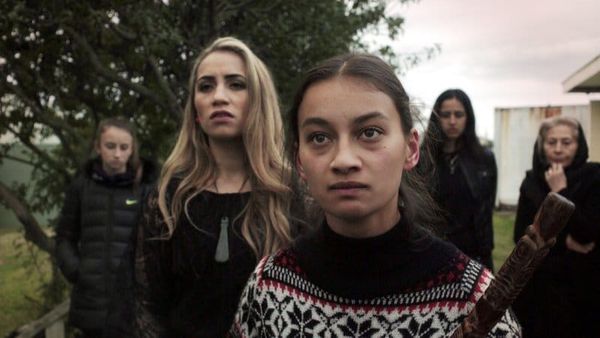Eye For Film >> Movies >> Waru (2017) Film Review
Waru
Reviewed by: Andrew Robertson

Waru speaks at the end, but he is one of few male voices in this film, and even then a child, always a child, for Waru is dead. The film may bear his name but it is not, directly, about him - instead about the women around him, in the same or similar situations, those growing up with and growing up within, those struggling, fighting.
Waru means 'eight', and there are eight sets of stories here, formally constructed within a formula that is ostensibly rigid but plastic enough for astonishing variety, invention. Real time stories, single takes, all starting at fifty nine minutes past nine, all shot in a single day. All written, directed, by Maori women. All set around the tangi for poor Waru, his funeral rites at once observed and unobserved. Anthologies live and die in selection, and here producers Kerry Warkia and Kiel McNaughton have been careful, wise, successful.

At film festivals one can often end up with trends, commonalities brought about more through convenience than curatorial intent - it happened that I saw Waru on a day where almost every other film I caught was hinged upon the death of a child. It is easy to be a film critic, you just have to sit there and watch - it is harder at others, because you have to sit there and watch.
Watching is too much for the women of Waru - before and behind and upon the screen they have something to say. You should see it - it feels like saying too much to talk about how intimate a portrait of grief it seems, and not just in the sense (drawn from towering performances) that the often roving eye is intruding into privacies. At once more and less visible in death, Waru takes us through locked doors, onto otherwise empty porches, to ancestral lands we cannot claim to, into fields of corporate conflict where micro-aggressions call to the warrior within. This is powerful and painful, striking. With the distance of a day or two I still cannot think of the great-grandmothers seeking to lay Waru to rest in the right way and the right place without my heart becoming sad. It is one moment of poetic clarity in a film full of them.
I could talk about production realities - there are scenes that must have been achieved with the same kind of rigs that The Raid 2 used to film car chases, Mad Maxian appendages to vehicles or film cars to have cameras detached and passed around. That free approach, that endless roving character, gives strength even when we have moments constrained to pacings around a kitchen, to the front seats of a van, to the boundaries of the hereafter and ancestral lands, to the gap between politics and perception - all of it in service to an artistic constraint and commendable talent.
I can mention Mad Max again to talk about how, like Fury Road, this is a film that not only passes the Bechdel test but comes close to passing some kind of supercharged version - no conversation between two men, except about a woman. The point bears repeating, and Waru does - these are voices worth harking unto.
There are moments of innocence - when children playing refer to "chasing the dragon" there's implications beyond their ken. There are other examples of poverty, of incaution, of magic. Even in bounds as narrow as those single shots, there is variety. There are commonalities - one production designer, one editor, one DoP - but even with a consistency of vision there are varieties in look, in feel, but I would not say in touch - only after seeing Waru (which you should, if you can) can that consistency of execution be felt.
So many that I cannot in fairness single any out - the credits give them their due, each chapter separately recorded - and I would only be echoing that. The space here is better used to tell you to go and see it. There are many stories, many the same, from the same place, and the same circumstances - they are not solely Maori stories, nor are they solely women's stories, but these are Maori women speaking to and of tradition, to and of the modern age, to and of their audience. These are old stories in new ways, new stories of old ways. See them.
Reviewed on: 22 Jun 2018















